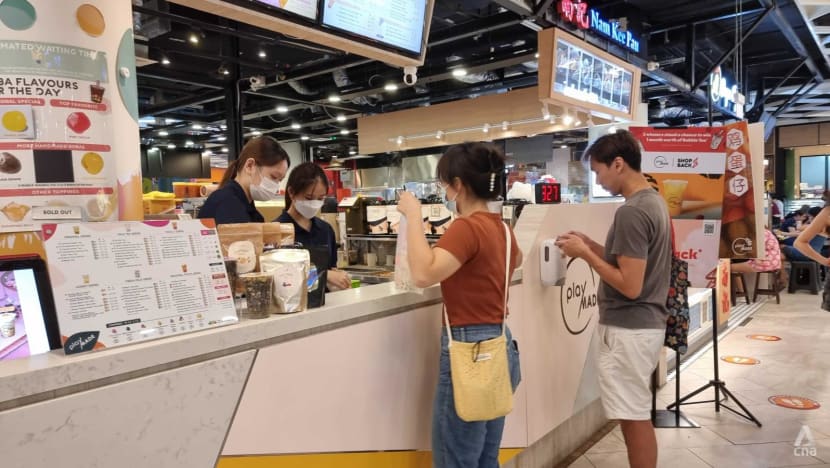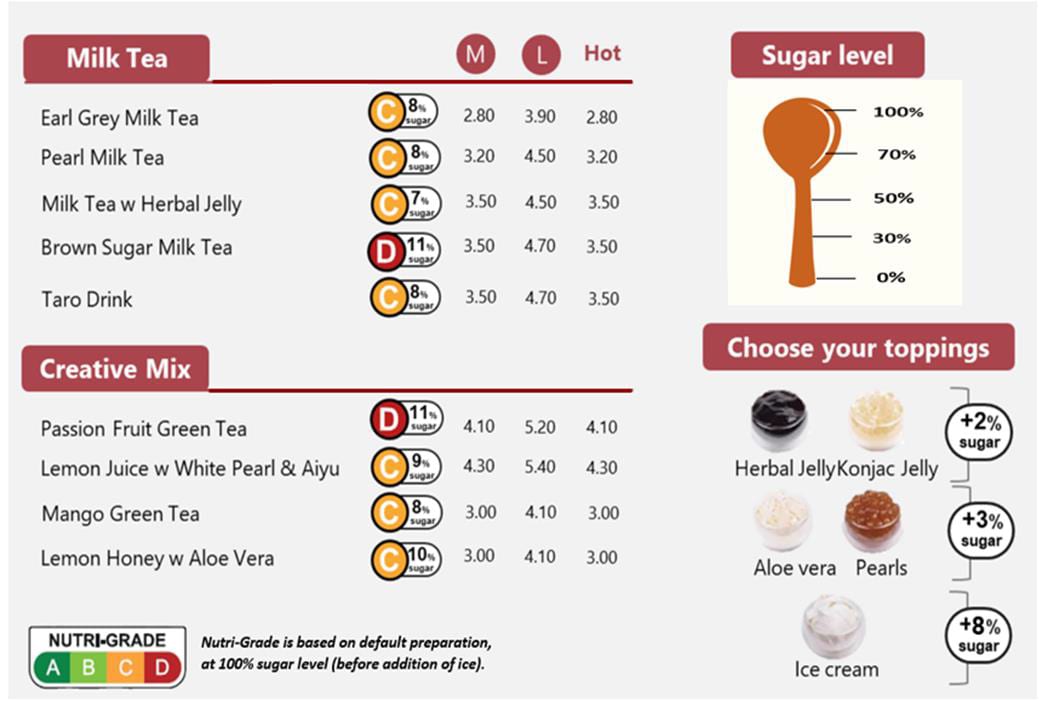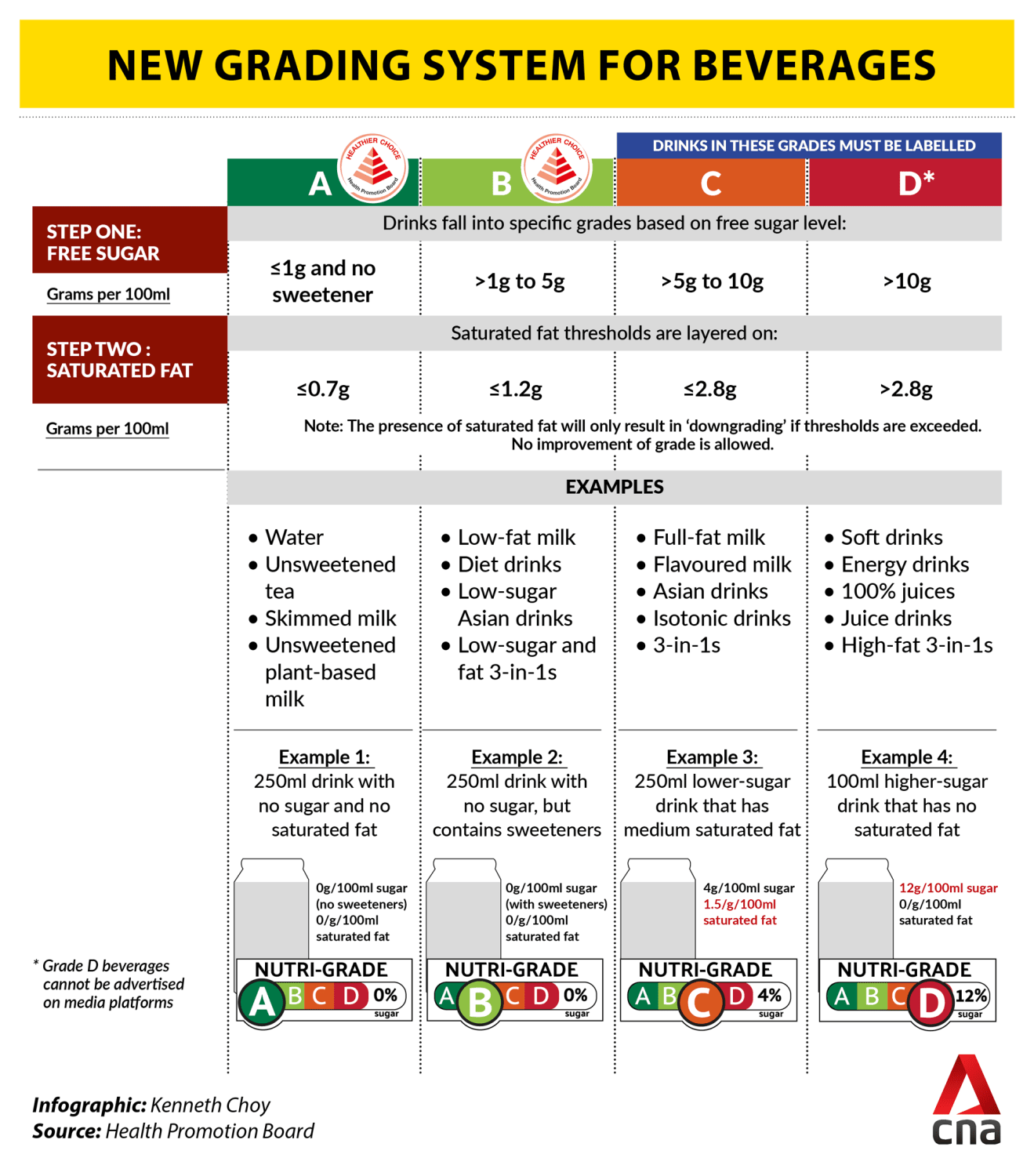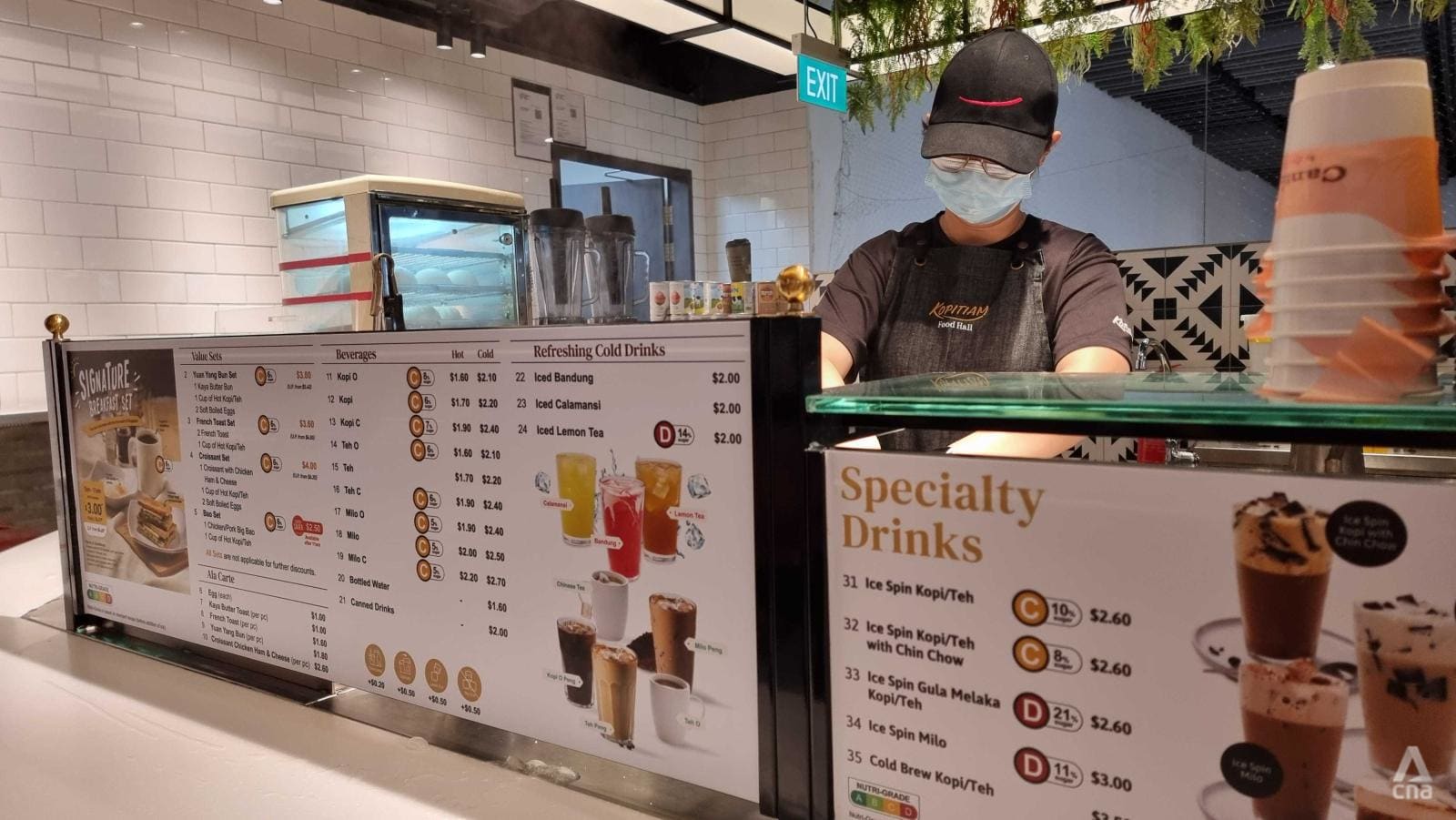Nutri-Grade labels? Some Singaporeans draw a blank at new health mark for freshly made drinks
The labels will be mandatory from Dec 30, and some F&B businesses have been adjusting their menus to make their drinks healthier.

Customers buying drinks at a bubble tea kiosk in December 2023. (Photo: CNA/Chew Hui Min)

This audio is generated by an AI tool.
SINGAPORE: At a PlayMade bubble tea kiosk in a mall at Paya Lebar, the menu now sports little circles with a health grading for each drink.
These Nutri-Grade labels will be compulsory for freshly made beverages from Dec 30, after being introduced for packaged drinks since December 2022. The healthiest drinks are graded "A" while those with the highest sugar and/or saturated fat content get a "D".
Some food and beverage outlets have already updated their menus, with bubble tea chain PlayMade rolling out theirs from Dec 18.
But there are customers who have yet to notice the change. Ms Syafiqah Nasir, who was waiting for her bubble tea, was surprised when told there were Nutri-Grade labels on the menu she had just ordered from.
"I think it's because (the label) is a bit too small, and sometimes you know what you want and you just focus on the name of the drink," she said. "Now that I'm aware, maybe I'll be more conscious."
Mr Khoo, 49, who ordered from another bubble tea stall, also said he didn't really look at the labels given how there was already so much information on the menu to absorb.
And 18-year-old student Erin Chua thinks it's not that important: "As long as I exercise, it doesn't matter what kind of drinks I drink."
For others CNA spoke to, it mattered how healthy their drinks were. These consumers said they were already ordering their drinks with zero or reduced sugar levels, or without adding pearls or boba to their bubble tea.
For toppings such as pearls and jellies, consumers can also identify those that are lower in sugar by referring to sugar declaration marks, the Ministry of Health (MOH) said in a press release in June.
Another major change is that advertisements promoting the sale of drinks graded D will be prohibited. Businesses that do not comply can be fined, but smaller retailers are exempted if conditions are met, MOH said.
A week before the Dec 30 date of implementation, CNA spotted Nutri-Grade labels at a few other eateries and stalls including ToastBox, Kopitiam, Geylang Claypot Rice, Mr Bean and LiHo.

CUTTING DOWN ON SUGAR
In response to CNA's queries, some F&B businesses said they have been adjusting their menus to make their drinks healthier, and to meet the requirements of the Health Promotion Board (HPB).
Local bubble tea chain LiHo, for one, has sourced for new ingredients with less sugar and saturated fat, and come up with a healthier creamer formula used in a new range of light milk teas, said its senior marketing executive Ronald Eng.
LiHo has also reduced the maximum amount of sugar customers can add to their drinks.
"Currently, our 100 per cent sugar level is based on what was 50 per cent sugar," said Mr Eng.
An older LiHo menu had 12 drinks labelled D, while a new menu has seven. It also has more B options than before.
But like other bubble tea outlets, the majority of LiHo's drinks are in the C category.
The new menu for another bubble tea chain, The Whale Tea, has 76 per cent of its drinks graded C; 10 per cent D; 7 per cent A and another 7 per cent B.
But it's making an effort to create products graded A to cater to health-conscious customers, according to marketing manager Clement Low.
PlayMade said that the majority of its drinks will fall under the B and C categories, with some under grade A in a new menu to be rolled out next year.
Meanwhile, the Mr Coconut chain is replacing added sugar with stevia, introducing a "lite" series and phasing out any grade D drinks, said co-founder Lucas Lin.

The BreadTalk Group has also adjusted its menus at its food courts and Toast Box cafes.
At Toast Box, hot beverages - except for Milo - have been reformulated to improve their Nutri-Grade scores, said Ms Tan Lee Yen, senior manager for loyalty partnership and corp affairs.
At Food Republic and Food Junction, drinks stalls have revamped recipes for homemade drinks such as iced barley, she said. Pre-packaged offerings have also been reviewed to include zero sugar and healthier choice beverages.
A FairPrice Group spokesperson said its Kopitiam brand of coffeeshops had launched a Nutri-Grade mark menu as early as in September, and would progressively roll it out across all 85 outlets.
Other than kopi-O kosong (black coffee with no sugar), teh-O kosong (tea with no milk and no sugar), Chinese tea and plain water, there were few drinks labelled A at various coffeeshops and food courts CNA visited.
This is no surprise as to be labelled A, the drink has to have 0 per cent sugar, and saturated fat of 0.7g or less.
Grade B drinks are also few and far between. These have less than 5g of sugar and 1.2g of saturated fat.
Drinks that qualify are kopi or teh siu dai (less sugar), as well as bubble tea with 30 to 50 per cent sugar and no milk or toppings.
A regular coffee, tea, malted drink or bubble tea with 70 per cent sugar would be graded C.

Ms Rachel Ong, 20, told CNA she was aware of the Nutri-Grade labels but didn't find them useful since most drinks are graded C.
"Technically you can't order a healthier option, so to me, I just overlook (the label)," said the self-confessed former bubble tea addict.
Ms Ivy Tan, 50, was sitting at a food court sipping a soursop drink. She said the fruit toppings looked healthy but the beverage ended up being far too sweet for her.
When I pointed out that her drink had a D grading, she was surprised and said she hadn't noticed the Nutri-Grade mark. While printed on a menu, the label was not shown on a screen above the drinks counter.
A few other diners at the same food court also said they did not pay particular attention to Nutri-Grade marks. But most said they were already consciously ordering drinks with less or no sugar.
Ms Tan shared that when she tries to order drinks with no sugar, she's often told that the drinks are pre-made so she has to take them as they are, or diluted with water to be less sweet.
It's this lack of beverage and sugar level options that bothers her, said the teacher.
How then to have a healthy drink in Singapore? Ms Tan said with a laugh: "Bring your own water!"
















